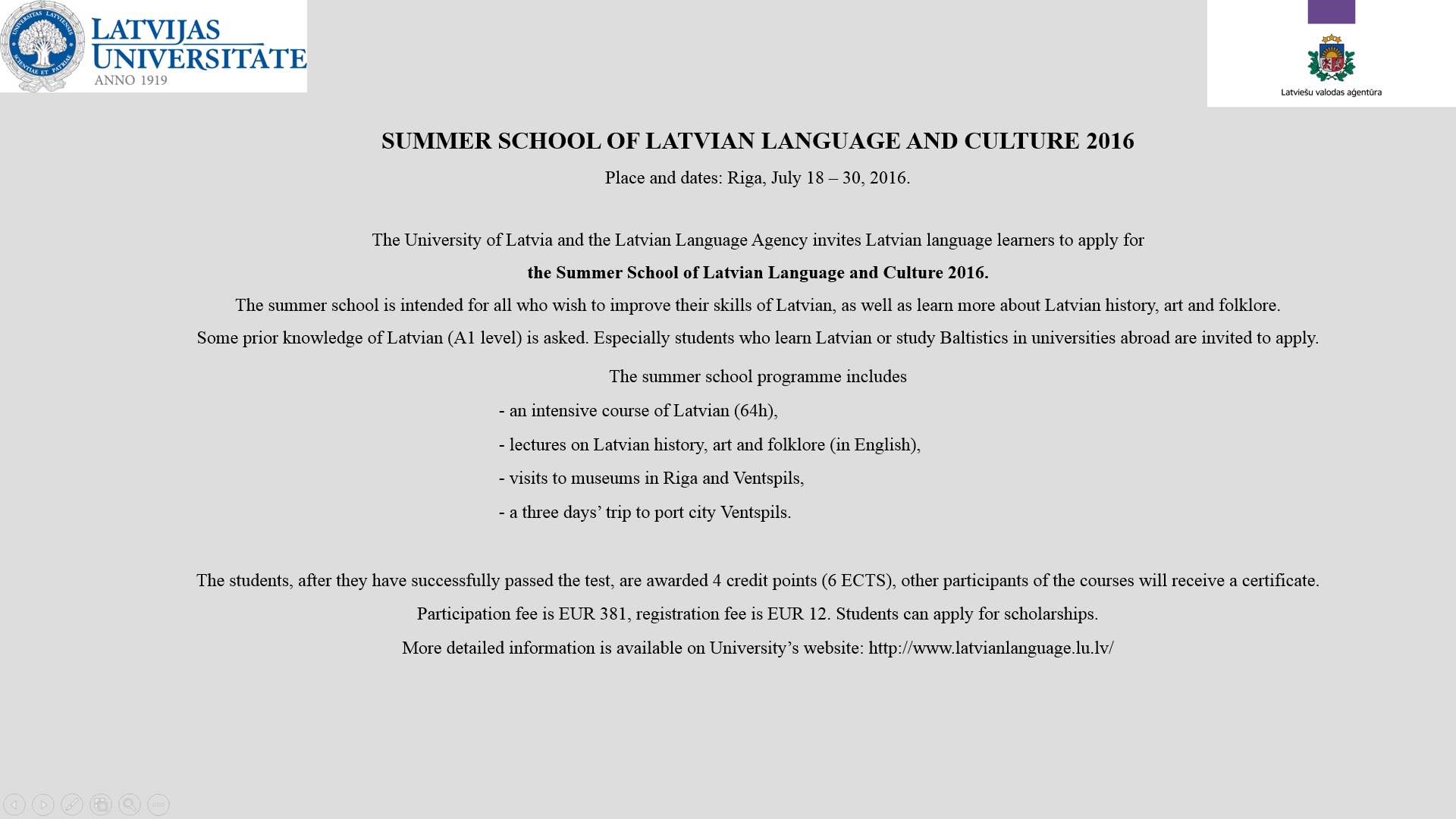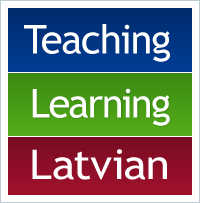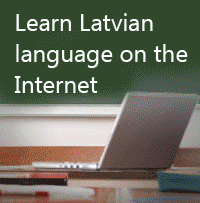Current issues
Call for Papers: LIVONICA V. Significance of Livonian Heritage
28.04.2015.Līvõ Kultūr Sidām (Livonian Culture Centre), University of Tartu, and Latvian Language Agency invite you to participate in the international scientific conference „LIVONICA V: Significance of Livonian Heritage” that will be held on 10 September 2015.
Conference topics: language, history, cultural history, literature, ethnology, music etc.
Working languages: Livonian, Estonian, Latvian, English.
Please submit the abstract of your paper electronically by 30 May 2015.
New Latvian Language Textbook for Estonian students launched in Latvian Language Agency
13.10.2014. The Latvian Language Agency has published a new Latvian language textbook, aimed at Estonian students. The author of the textbook is Ilze Zagorska, the lecturer of the Latvian language and culture at the University of Tartu. Ilze has been teaching Latvian to Estonian students for six years and the newly-published textbook is based on her teaching experience. The textbook is meant for beginners, it contains 13 chapters of reading, writing and speaking exercises, a Latvian-Estonian dictionary and a supplement that explains the grammatical topics included in the textbook. The book is artfully designed and colourfully illustrated by Ģirts Semēvics and Inese Siliniece.
The Latvian Language Agency has published a new Latvian language textbook, aimed at Estonian students. The author of the textbook is Ilze Zagorska, the lecturer of the Latvian language and culture at the University of Tartu. Ilze has been teaching Latvian to Estonian students for six years and the newly-published textbook is based on her teaching experience. The textbook is meant for beginners, it contains 13 chapters of reading, writing and speaking exercises, a Latvian-Estonian dictionary and a supplement that explains the grammatical topics included in the textbook. The book is artfully designed and colourfully illustrated by Ģirts Semēvics and Inese Siliniece.
A new sociolinguistic study “Language ideology and mass media (television)” is available electronically
03.10.2014. The aim of study is to analyse the demonstration of official language ideology of state in television, taking into account that it is the most popular medium. The aim of the official language policy in Latvia is to ensure the protection and development of the Latvian language, the sole official language of Latvia, paying attention that it should serve as the common language of mutual communication of all inhabitants of Latvia. The results of interviews with experts and representatives of television stations were analysed having regard of data of quantitative researches.
The aim of study is to analyse the demonstration of official language ideology of state in television, taking into account that it is the most popular medium. The aim of the official language policy in Latvia is to ensure the protection and development of the Latvian language, the sole official language of Latvia, paying attention that it should serve as the common language of mutual communication of all inhabitants of Latvia. The results of interviews with experts and representatives of television stations were analysed having regard of data of quantitative researches.
In order to facilitate the development of Latvian and its use in every domain of life, the Latvian language should be at the top of the language hierarchy in all domains, including the mass media. The latter, especially television that is the most popular medium, have a significant role in forming and influencing public opinion in Latvia.
The summary of the study “Language situation in Latvia: 2004-2010” is available electronically
01.02.2013.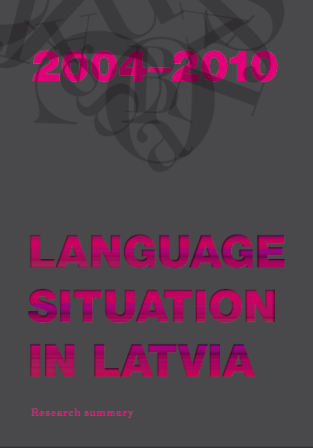 This summary outlines the major conclusions of the study “Language situation in Latvia: 2004-2010” (2011) and the results of the Latvian language policy implementation.
This summary outlines the major conclusions of the study “Language situation in Latvia: 2004-2010” (2011) and the results of the Latvian language policy implementation.
According to the structure of the study “Language situation in Latvia: 2004-2010” here are data and facts reflected about the language situation in the Latvia from 2004 to 2010, taking into account the historical development of the language situation.
New Textbook to Study Latvian for Japanese!
01.01.2013.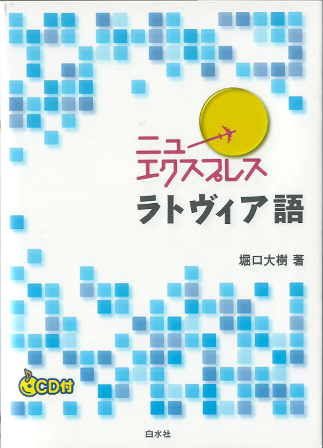 The Latvian Language Agency has received a completely new Latvian language textbook for Japanese students which was composed and generously sent by Daiki Horiguchi, PhD student and Latvian language lecturer at the Foreign Languages University of Tokio. We are very happy and grateful for Daiki’s devotion and efforts, and his great contribution to Latvian language in the far away and beautiful Japan. Let this book be of a great help for the students in Japan and let it help to become proficient Latvian language users and friends of Latvia!
The Latvian Language Agency has received a completely new Latvian language textbook for Japanese students which was composed and generously sent by Daiki Horiguchi, PhD student and Latvian language lecturer at the Foreign Languages University of Tokio. We are very happy and grateful for Daiki’s devotion and efforts, and his great contribution to Latvian language in the far away and beautiful Japan. Let this book be of a great help for the students in Japan and let it help to become proficient Latvian language users and friends of Latvia!
Translation in English of „In Defence of the Latvian Language Against Russification. Documents from 1944-1989” is published
12.12.2012.In 2012 the Latvian Language Agency published a book compiled by historian 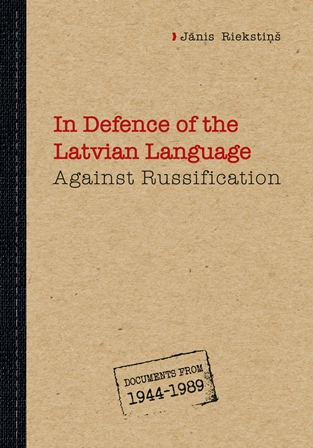 J. Riekstiņš in Latvian.
J. Riekstiņš in Latvian.
This edition has been translated into English (translators – Uldis Brūns un Jānis Kramēns). Documents utilized are from the Latvian Archive collection of the Latvian Communist Party Central Committee records, the Latvian Communist Party Central Control and Auditing Committee, the Latvian Soviet Socialist Republic Council of Ministers, the Latvian Soviet Socialist Republic Supreme Council, the Riga City Executive Committee, as well as documents from collections of other institutions, that verify the Soviet policies in Latvian SSR. Many of these documents are published for the first time (even in Latvian).
The summary of the study “The influence of migration on language environment in Latvia” is available electronically
11.10.2012.The present study was preparing by compiling and extending the research 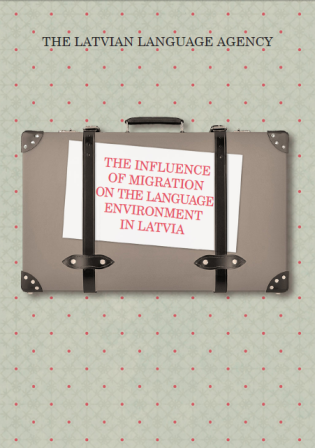 “Migrācijas ietekme uz valodas vidi Latvijā” (“The influence of migration on language environment in Latvia”. The Latvian Language Agency. Rīga : Zinātne, 2009. P. 143).
“Migrācijas ietekme uz valodas vidi Latvijā” (“The influence of migration on language environment in Latvia”. The Latvian Language Agency. Rīga : Zinātne, 2009. P. 143).
The work prepared by the authors is a scientific study that looks at the question of immigration mainly from the linguistic and integration perspective. The present study has been conducted to help to evaluate positive and negative factors of the integration process, the development and implementation of new, adequate socio-political and economic solutions (taking into account the latest trends in migration processes and the decrease of the number of the population in Latvia).
THE NEW LIVONIAN – ESTONIAN – LATVIAN DICTIONARY HAS BEEN PUBLISHED
13.09.2012.University of Tartu in Estonia and Latvian Language Agency in Latvia has published the biggest Livonian language dictionary yet – “Livonian – Estonian – Latvian dictionary”. The dictionary was compiled by Tiit-Rein Viitso, the emeritus professor at the University of Tartu, and the researcher at the University of Tartu Dr.phil. Valts Ernštreits.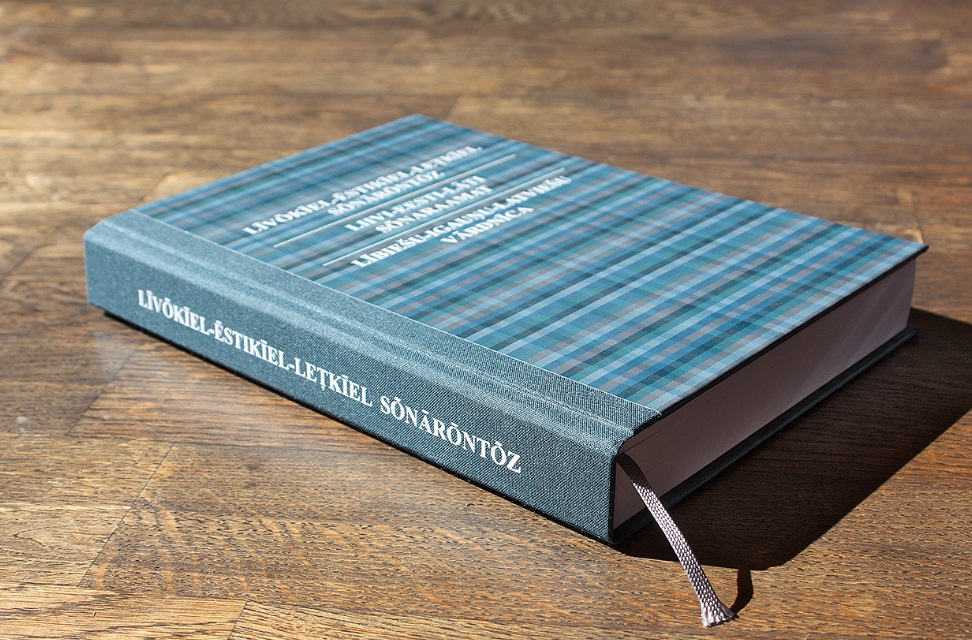
“The “Livonian – Estonian – Latvian dictionary” has already become a fundamental and unique culturally historical event for all three nations inhabiting the shores of the Baltic Sea – Livs, Latvians and Estonians. It is astonishing that until now there has not been a complex dictionary of Livonian literary language. Now it is finally done,” says Andris Bērziņš, president of the Republic of Latvia. For the first time Estonian and Latvian languages are used for translation, and the grammar explanations are provided for every word, allowing using it not only for academic purposes but also for acquiring the language. It is also supplemented with the pronunciation and declension descriptions, and it includes large number of examples.

